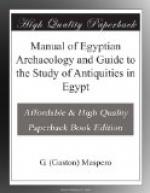Sec. 1. Drawing and composition:—Supposed Canon of Proportion—Drawing Materials—Sketches—Illustrations to the Book of the Dead— Conventional Treatment of Animal and Human Figures—Naturalistic Treatment—Composition—Grouping—Wall-paintings of Tombs—A Funerary Feast—A Domestic Scene—Military Subjects—Perspective—Parallel between a Wall-painting in a Tomb at Sakkarah and the Mosaic of Palestrina
Sec. 2. Technical
processes:—The Preparation of Surfaces—Outline—
Sculptors’ Tools—Iron
and Bronze Tools—Impurity of Iron—Methods
of
Instruction in Sculpture—Models—Methods
of cutting Various Stones—
Polish—Painted
Sculptures—Pigments—Conventional
Scale of Colour—
Relation of Painting to Sculpture
in Ancient Egypt
Sec. 3. Sculpture:—The Great Sphinx—Art of the Memphite School—Wood- panels of Hesi—Funerary Statues—The Portrait-statue and the Double —Chefs d’oeuvre of the Memphite School—The Cross-legged Scribe—Diorite Statue of Khafra—Rahotep and Nefert—The Sheikh el Beled—The Kneeling Scribe—The Dwarf Nemhotep—Royal Statues of the Twelfth Dynasty—Hyksos Sphinxes of Tanis—Theban School of the Eighteenth Dynasty—Colossi of Amenhotep III.—New School of Tel el Amarna—Its Superior Grace and Truth—Works of Horemheb—School of the Nineteenth Dynasty—Colossi of Rameses II.—Decadence of Art begins with Merenptah—Ethiopian Renaissance—Saite Renaissance—The Attitudes of Statues—Saite Innovations—Greek Influence upon Egyptian Art—The Ptolemaic and Roman Periods—The School of Meroe—Extinction of Egyptian Art
CHAPTER V.
THE INDUSTRIAL ARTS.
Sec. 1. STONE, CLAY, AND GLASS:—Precious Stones—Lapidary Art—Beads and Amulets—Scarabaei—Statuettes—Libation Tables—Perfume Vases—Kohl- pots—Pottery—Clay—Glazes—Red and Painted Wares—Ushabtiu—Funerary Cones—Painted Vases—“Canopic” Vases—Clay Sarcophagi—Glass—Its Chemical Constituents—Clear Glass—Coloured Glass—Imitations of Precious Stones in Glass—Glass Mosaics—Miniature Objects in Coloured Glass—Glass Amulets—Coloured Glass Vases—Enamels—The Theban Blue— The Enamels of Tell el Amarna—Enamelled Ushabtiu of Amen Ptahmes— Enamelled Tiles of the Step Pyramid at Sakkarah—Enamelled Tiles of Tell el Yahudeh
Sec. 2. WOOD, IVORY,
LEATHER; TEXTILE FABRICS:—Bone and Ivory—Elephant
Tusks—Dyed Ivory—Egyptian
Woods—Wooden Statuettes—Statuette
of
Hori—Statuette
of Nai—Wooden Toilet Ornaments—Perfume
and Unguent
Spoons—Furniture—Chests
and Coffers—Mummy-cases—Wooden
Effigies on
Mummy Cases—Huge
Outer Cases of Ahmesnefertari and Aahhotep—Funerary
Furniture—Beds—
;Canopies—Sledges—Chairs—Stools—Thrones—
Textiles—Methods
of Weaving—Leather—Breast-bands
of Mummies—
Patchwork Canopy in Coloured
Leather of Princess Isiemkheb—
Embroideries—Muslins—Celebrated
Textiles of Alexandria




